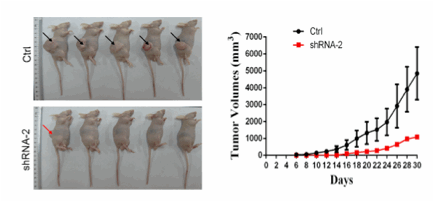Abstract
IRF8 is a transcription factor with a critical role in B lymphocyte development and biological functions. Although it has been reported that IRF8 is highly expressed in human diffuse large B-cell lymphoma (DLBCL) and the translocation of IRF8-IgH loci occurs in DLBCL, little information is available regarding the function and mechanisms for the role of IRF8 in DLBCL. In this study, by using several human DLBCL cell lines with shRNA-mediated decrease in IRF8 expression levels, we found that the loss of IRF8 significantly reduced the proliferation of lymphoma cells (Figure 1). Mechanistically, decreasing the levels of IRF8 led to a decrease in p38 and ERK phosphorylation (Figure 2), molecular events critical for B cell proliferation. Furthermore, using a xenograft lymphoma mice model, we found that the loss of IRF8 significantly inhibited the growth of lymphomas in vivo (n=5 for each group) (Figure 3). Analysis of public available data also suggested that the expression levels of IRF8 mRNA in human DLBCL tissues were inversely correlated patientsÕ overall survival time. Taken together, this study showed that IRF8 may play an oncogenic role in human DLBCL by promoting cell proliferation.
Loss of IRF8 decreased the proliferation of DLBCL cells in vitro.
Loss of IRF8 decreased the proliferation of DLBCL cells in vitro.
Loss of IRF8 decreased the phosphorylation of p38 and ERK in DLBCL cells.
Loss of IRF8 decreased the phosphorylation of p38 and ERK in DLBCL cells.
Loss of IRF8 decreased the growth of DLBCL in vivo.
No relevant conflicts of interest to declare.
Author notes
Asterisk with author names denotes non-ASH members.




This feature is available to Subscribers Only
Sign In or Create an Account Close Modal